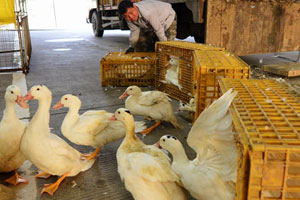Public health experts called for more detailed guidelines to implement a new border inspection policy by the General Administration of Quality Supervision, Inspection and Quarantine for the prevention and control of the human H7N9 bird flu.
The administration has issued an emergency notice requiring strengthened border control to help curb the virus.
| |||
On Sunday, Vice-Premier Liu Yandong called for coordinated efforts to prevent and control H7N9 avian flu, particularly while a colossal number of people migrate for the Spring Festival holiday.
In response, the administration issued a notice to contain potential cross-border spreading of the H7N9 virus and protect the health of those who enter or exit the country.
Current H7N9 cases among humans are scattered across the country and there is no evidence of constant inter-human transmission, according to a paper on H7N9 diagnosis and treatment issued by the National Health and Family Planning Commission on Sunday.
The paper said that the infection source might be the poultry that carry the H7N9 bird flu virus.
The H7N9 bird flu could be transmitted via respiratory infections, close contact with poultry excretion or contact with a contaminated environment.
However, analysis suggests that although the viruses have evolved in birds, they may infect mammals more easily than other avian viruses like the strain of H5N1, said Bernhard Schwartlander, WHO China representative.
He Xiong, deputy director of Beijing's disease control and prevention center, said the measures taken by the General Administration of Quality Supervision, Inspection and Quarantine were preemptive but hard to implement.
First of all, it's hard to make sure if someone is telling the truth about contact with birds, he explained.
To facilitate the measures he urged for more detailed implementation guidelines.
According to He, it takes three or four hours to generate a result for H7N9 testing.
On Sunday, three new cases of H7N9 in humans were reported in Zhejiang and Guangdong provinces, the commission said.
Zhejiang, which had discovered new H7N9 cases for 18 consecutive days by Sunday, and has seen a total of 49 cases, is home to the largest number of human infections among all provinces this year. Twelve people have died in the province because of the virus as of Monday.
Shanghai, Zhejiang, Beijing, Jiangsu, Fujian and Guangdong have also detected cases.
Information about the epidemic situation and preventive tips must be disseminated at transport stations and border check points, said the latest notice. Information exchanges with health departments have been enhanced, it said.
In another development, the National Health and Family Planning Commission pledged to strengthen H7N9 prevention and control and improve treatment capacity. Training will be organized for medical workers to help with early detection and treatment.
|
Also popular | |
 |
 |
